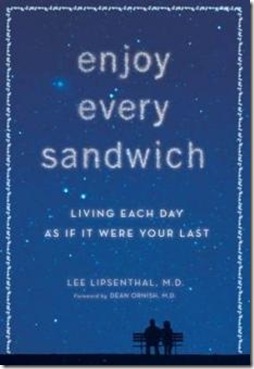 As medical director of Dean Ornish’s Preventive Medicine Research Institute in California, Lee Lipsenthal regularly helped patients overcome their fear of pain and death. But just short of his 52nd birthday in 2009, Lipsenthal was diagnosed with esophageal cancer and told he had at most only a few years to live.
As medical director of Dean Ornish’s Preventive Medicine Research Institute in California, Lee Lipsenthal regularly helped patients overcome their fear of pain and death. But just short of his 52nd birthday in 2009, Lipsenthal was diagnosed with esophageal cancer and told he had at most only a few years to live.
Enjoy Every Sandwich is the author’s upbeat account of how he used meditation and mindfulness to find pleasure in each moment of his remaining time.
Lipsenthal died Sept. 20, just before his book was published.
After his grim diagnosis, the author decided to use a combination of traditional medicine, as well as supplements such as meditation, which he calls “my most powerful drug.”
Lipsenthal describes the Buddhist-based practice of living fully in each moment, without control or attachment to a particular outcome. But along the way he veers into controversial New Age concepts that might puzzle some readers. He describes strange coincidences, as well as his own reincarnation, and remembers having lived in France, Germany and ancient Greece in previous lives. He concedes there is no rational explanation for any of this.
Lipsenthal’s unusual spiritual journey puzzled and at times angered his wife, Kathy, who also is a physician. She protested that he seemed resigned to dying. But Lipsenthal makes an important distinction between giving up the fight and simply refusing to waste time trying to control everything, including the course of his cancer.
Over the years, the author had witnessed the health benefits of regular meditation, which he taught to his patients.
“I knew intuitively,” he says, “that the best therapy for me was to quiet down, stop being busy, meditate an hour or more daily, hike, and choose what treatments, either conventional or complementary, would maximize my healing capacity.”
He also found strength and joy by cultivating gratitude. He kept a journal by his bedside and each night listed three things he was grateful for that day.
 As a medical doctor, Lipsenthal says he initially was skeptical of practices and beliefs that have no scientific basis. Although his skepticism remained, he concluded there is a spiritual reality beyond the known physical world – a reality that scientists cannot explain.
As a medical doctor, Lipsenthal says he initially was skeptical of practices and beliefs that have no scientific basis. Although his skepticism remained, he concluded there is a spiritual reality beyond the known physical world – a reality that scientists cannot explain.
“I have come to believe,” he says, “that there probably is a higher power, a God or Spirit that affects human behavior. I have seen too much data in my life that could not be explained any other way, but the scientist in me also sees the possibility that God is simply a creation of the human imagination.”
Lipsenthal says that fear of aging, illness and death produces stress hormones that wear down the immune system’s ability to fight cancer.
“Instead of worrying about when I might die and adding anxiety to each day I had left, I decided to enjoy the time I had with good music, good food, lots of love, and the quiet time that my soul and immune system needed.”
The book’s title comes from the singer/songwriter Warren Zevon, who had terminal cancer and was asked what he had learned in the process of dying. He replied, “I learned to enjoy every sandwich.”
Lipsenthal advises readers, “Pay attention to the good stuff that happens every day and enjoy what is, not what should have been or what might be.”
This poignant and occasionally inspiring book ends too abruptly, with no mention of the author’s final days. Because the text is so focused on Lipsenthal and his coping strategies, we learn little about the impact of the author’s illness and death on his wife and their grown son and daughter.
It would have been a welcome addition if one of them had written a concluding chapter or afterward to bring the story to closure.
Enjoy Every Sandwich: Living Each Day As If It Were Your Last, by Lee Lipsenthal; Crown Archetype; 195 pp.; $22
Bill Williams is a free-lance writer in West Hartford, Conn., and a former editorial writer for The Hartford Courant. He is a member of the National Book Critics Circle and can be reached at billwaw@comcast.net.